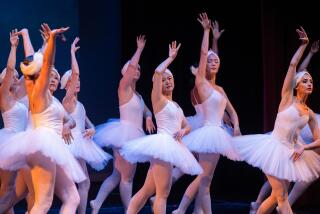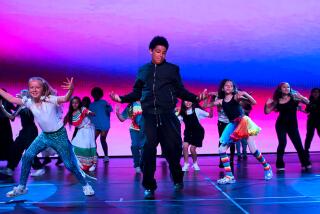S. Africa Raises Barre in Black Townships
- Share via
GUGULETU, South Africa — On the dusty, shack-lined streets of Guguletu, most little boys dream of becoming soccer heroes or boxing champions.
But ask Peacemaker Sakayi what he wants to do when he grows up, and the 12-year-old replies without hesitation: “I want to dance ballet.”
Peacemaker is one of about 20 boys and girls who brave the ridicule of friends to attend weekly dance lessons in a makeshift studio at a nearby technical college.
Unlike students in white neighborhoods, the black children in this gritty Cape Town township have no mirrors in which to check their movements and no pianist to accompany them. They dance to cassette-recordings of the classics, using the backs of plastic chairs as a barre.
Peacemaker said ballet will make him “big and strong,” and he knows his grandmother is happy to see him dancing instead of hanging out on the streets.
The Cape Performing Arts Board ballet company, known as Capab, began the classes four years ago. South African ballet companies, guaranteed government funding under white-minority rule, have come under pressure to broaden their appeal. Apartheid began to be dismantled in 1990, and a new black-led government took over after historic all-race elections in 1994.
Although traditional African dance is popular in such places as Guguletu, ballet is often derided as one of the stranger interests of white people.
Valrie Sanders, who studied in the United States, is the only black member of Capab’s 40-dancer professional company.
“When I tell people that I dance, they automatically assume that I do jazz or hip-hop or something like that,” Sanders said. “When I specify ballet, they do get a bit surprised.”
Sipho Manashe, who recently left Capab to accept a dance scholarship in London, was 21 before he took his first lesson, although his peers had been dancing since they were about 11.
After finishing school, he spent a year with no job and nothing to do before a friend told him about free acting classes offered by the local university. The lessons included some dance training, and Manashe was hooked.
Friends and family could not understand his choice, telling him ballet was “a girl’s dance” and “a white thing,” Manashe recalled.
“My mom just said, ‘I am losing my son. My son is going to become a girl,’ ” he said.
He believes attitudes will change as more black dancers join ballet companies. Already, participation in Capab’s township program has increased from the handful who joined the first classes four years ago to about 200 today.
Weekly classes are offered free, and five of the most promising students have been granted scholarships for more intense training with the company’s main school.
But Capab’s annual tuition of about $130 is beyond the reach of most black families.
“Most of these children will never become professional dancers, but I have seen incredible changes in them,” said Philip Boyd, coordinator of the Guguletu program.
His hope is that at least some of his students will go on to form their own company and use their ballet training to develop a new, uniquely South African dance style.
More to Read
Sign up for Essential California
The most important California stories and recommendations in your inbox every morning.
You may occasionally receive promotional content from the Los Angeles Times.













